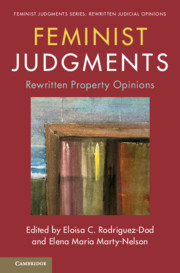Book contents
- Feminist Judgments: Rewritten Property Opinions
- Feminist Judgments Series
- Advisory Panel for Feminist Judgments Series
- Feminist Judgments: Rewritten Property Opinions
- Copyright page
- Dedication
- Contents
- Advisory Panel for Feminist Judgments: Rewritten Property Opinions
- Notes on Contributors
- Preface
- Acknowledgments
- About the Cover Art
- Part I Introduction
- Part II Allocation of Rights
- Part III Patents, Publicity Rights, and Trademarks
- Part IV Condemnation and Adverse Possession
- Part V Gifts and Future Interests
- Part VI Tenancy in Common, Joint Tenancy, and Tenancy by the Entirety
- Part VII Exclusionary Zoning
- 15 Commentary on Moore v. City of East Cleveland
- Part VIII Evictions
- Part IX Landlord–Tenant Premises Liability
- Index
15 - Commentary on Moore v. City of East Cleveland
from Part VII - Exclusionary Zoning
Published online by Cambridge University Press: 21 October 2021
- Feminist Judgments: Rewritten Property Opinions
- Feminist Judgments Series
- Advisory Panel for Feminist Judgments Series
- Feminist Judgments: Rewritten Property Opinions
- Copyright page
- Dedication
- Contents
- Advisory Panel for Feminist Judgments: Rewritten Property Opinions
- Notes on Contributors
- Preface
- Acknowledgments
- About the Cover Art
- Part I Introduction
- Part II Allocation of Rights
- Part III Patents, Publicity Rights, and Trademarks
- Part IV Condemnation and Adverse Possession
- Part V Gifts and Future Interests
- Part VI Tenancy in Common, Joint Tenancy, and Tenancy by the Entirety
- Part VII Exclusionary Zoning
- 15 Commentary on Moore v. City of East Cleveland
- Part VIII Evictions
- Part IX Landlord–Tenant Premises Liability
- Index
Summary
Moore v. City of East Cleveland1 is both a victory and a missed opportunity. It is a victory in the context of the U.S. Supreme Court’s pronouncement of the reach of the Fourteenth Amendment’s protection of families. Moore extends the understanding of the liberty interest in family and family life found by the Court in the Due Process Clause of the Fourteenth Amendment to members of an extended family. Such reading of the liberty interest extends protections, given historical trends regarding who lives in extended families, to the poor, to minorities, to immigrant families, and to cultural “others.”
- Type
- Chapter
- Information
- Feminist Judgments: Rewritten Property Opinions , pp. 311 - 342Publisher: Cambridge University PressPrint publication year: 2021

